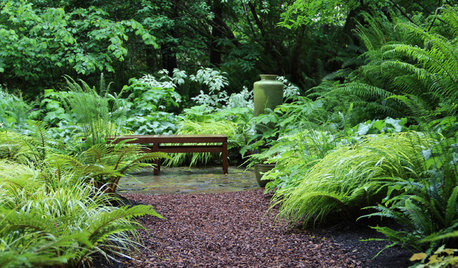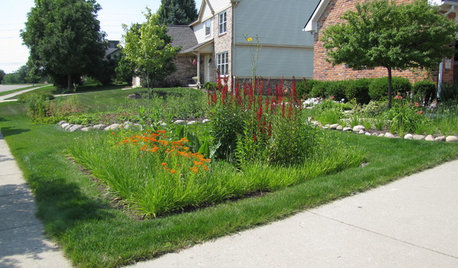Best way to improve soil
chilipete
15 years ago
Related Stories

GARDENING GUIDES10 Solutions for Soggy Soil
If a too-wet garden is raining on your parade, try these water-loving plants and other ideas for handling all of that H2O
Full Story
GARDENING GUIDESGardening Solutions for Heavy Clay Soils
What’s a gardener to do with soil that’s easily compacted and has poor drainage? Find out here
Full Story
LANDSCAPE DESIGNHow to Shape a Rain Garden and Create the Right Soil for It
Learn how to grade, lay out and amend the soil in your rain garden to support your plants
Full Story
GARDENING GUIDESGet the Dirt on Your Garden’s Soil
Understand how your soil supports your plants so you can ensure your garden’s success
Full Story
FARM YOUR YARDHow to Get Good Soil for Your Edible Garden
The nutrients in your soil feed the plants that feed you. Here are tips on getting it right — just in time for planting season
Full Story
GARDENING GUIDESHow to Stop Worrying and Start Loving Clay Soil
Clay has many more benefits than you might imagine
Full Story
GARDENING GUIDESHow to Pick a Mulch — and Why Your Soil Wants It
There's more to topdressing than shredded wood. Learn about mulch types, costs and design considerations here
Full Story
FALL GARDENING5 Ways to Put Fall Leaves to Work in Your Garden
Improve your soil and yard the organic way with a valuable garden booster that grows on trees
Full Story
GARDENING GUIDESThe Poop Scoop: Enrich Your Soil With Good Old Manure
Get over the ick factor already — this natural super-ingredient for soil has so many benefits, you'll wonder why you ever went chemical
Full Story
GARDENING GUIDESGrow a Beautiful Garden in Alkaline Soil
Got alkaline soil? Learn how to manage it and the many beautiful plants that will thrive in this ‘sweet’ soil
Full Story






mexicanhat
hoovb zone 9 sunset 23
Related Discussions
Least expensive way to improve my soil (sandy 'fill' from 1956)?
Q
NEWBIES: dealing with heavy clay soil
Q
Wanting to improve my soil...best, fastest, cheapest?
Q
poor drainage soil: how to improve it organically?
Q
kr222
rosesinny
bloominganne
jbcarr
karl_bapst_rosenut
kr222
hoovb zone 9 sunset 23
nastarana
erasmus_gw
cweathersby
tinyrose
rosesinny
karl_bapst_rosenut
berndoodle
kr222
hoovb zone 9 sunset 23
karl_bapst_rosenut
cactusjoe1
tinyrose
carla17
buffington22
gnabonnand
gnabonnand
louis_c
chilipeteOriginal Author
rosarama
mexicanhat
Maryl (Okla. Zone 7a)
diane_nj 6b/7a
hoovb zone 9 sunset 23
Maryl (Okla. Zone 7a)
rosesinny
curlydoc
prairielaura
kr222
piper101
hoovb zone 9 sunset 23
teka2rjleffel